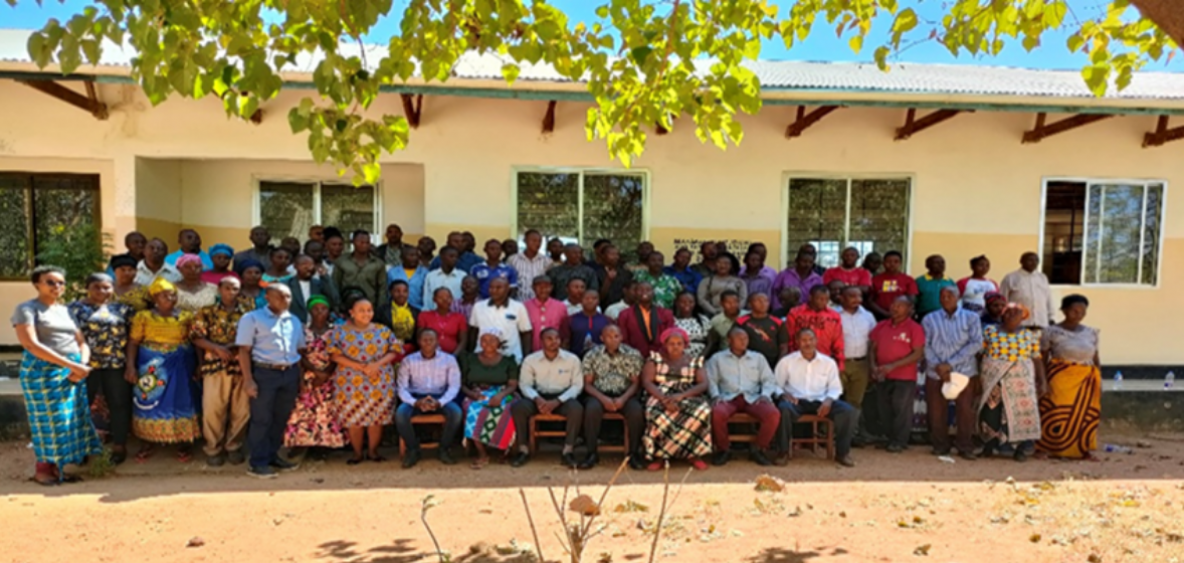 (Photo credit: IFAD Tanzania)
(Photo credit: IFAD Tanzania) A successful gender training session in Tanzania has led to greater insight into gender constraints in the RFS project sites and shifted the perspectives of local decision-makers to favour gender inclusivity.
In June 2021, the RFS Tanzania project, led by IFAD, successfully organized and conducted training on Gender Sensitive Approaches in Land Use Planning and Agro-pastoral Development at Landscape Level in the project areas. The training was designed to build capacity on mainstreaming gender into climate change mitigation, land use planning, agropastoralism, and food security at the local level.
The training was facilitated by gender specialists from the Institute of Rural Development Planning, a renowned institute in Tanzania, and included twenty-three villages across five districts in the semi-arid regions of the Tanzanian mainland and Zanzibar Island.
A total of 575 participants attended the training, and special consideration was given to sex and age in the selection of the participants.
The reason sex and age intersections are so important? Because Tanzanian women and girls face a great deal of challenges in improving their livelihoods. For example, despite 80% of women participating in subsistence farming, only 27% own land. Moreover, 60% of women in Tanzania live in extreme poverty.
Tanzanian women are beset with socio-economic challenges relating to gender roles, patriarchal power structures, access to education and divisions of labour. These challenges are exacerbated with age in turn and are translated into differential access to opportunities in agriculture; a cycle the RFS Tanzania project team is committed to disrupting through community-led initiatives that put women at the forefront.
In 2019, the country project team conducted a baseline study and found that access to and ownership of land was an obstacle to nearly 60% of female and youth respondents in achieving their economic goals. The project team set to work on finding solutions to mainstreaming gender in project activities and turned to the training session as a tool for knowledge sharing with the local community, leading to the summer session in 2021.
The RFS Tanzania country project, Reversing Land Degradation Trends and Increasing Food Security in Degraded Ecosystems of Semi-Arid Areas of Tanzania (LDFS), carries a strong focus on sustainable land and water management, so engaging with participants on the implications of gender on improving ecosystem services and household resilience to climate variability was central to the sessions.

The training sessions elicited information sharing from women, men, youth and decision-makers in the communities. The participants identified challenges that are unique to different groups, such as the sometimes dangerous and highly gendered task of water collection. In the context of climate change, deforestation is driving water sources to dry out, meaning that women and girls have to travel farther than before to collect water for their homes. This and many other issues identified in the session drew participants’ attention to the importance of gender-mainstreaming to the success of project activities, garnering support and shifting perspectives from key decision-makers.
“I had a negative perspective on mainstreaming gender issues in the development activities, but by attending this training my perspective has totally changed. Let me assure you that, the project has all my support in mainstreaming of gender issues in project activities and gender issues will be one of my agenda in all meetings that I will be organizing.” - Mr. Samwel Bosco, Ward Councillor for Mwangeza
"I promise to educate the rest of the villagers to support all existing LDFS Project activities, and the forthcoming one, and I will ensure that gender issues are properly mainstreamed in my village.” – Village chairman of Lumeji village in Magu district
The RFS Tanzania project’s success in communicating the gender agenda and collaborating with stakeholders on its importance is an important step in ensuring that the project’s goals are met and that the benefits are received by all. Gender mainstreaming has been and will again be a critical tool in the RFS toolbox, and it all starts with honest dialogue.
Subscribe to our monthly newsletter to receive updates on stories directly from the field across all our projects, upcoming events, new resources, and more.